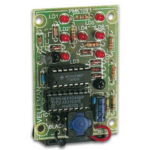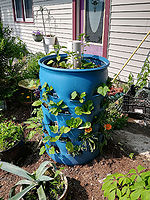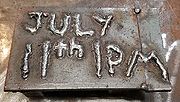Workshops
All workshops are for age 12 and older unless otherwise specified. Parents must come inside to fill out a minor liability waiver for children under 18 (unless previously filled out). Some workshops have limited seats available, see descriptions for details.
Pre-registration is required, and payment is due at the time of registration. Virtual workshops will send out room links 24-48 hours before a class. Virtual workshops with kits will coordinate pick-up of kits. Please direct any questions to contact@bloominglabs.org.
More workshops are still being added. Please join our announcement mailing list or follow us on Twitter! How to follow us
If there is a specific workshop you would like to see, let us know! We have a Google form: [Waitlist and Interest Sign-ups]. You can fill this out once for every desired workshop.
Contents |
June 2021
Introduction to Soldering/Electronics
Sunday, June 27th, 2021 -- 1:00 PM to 3:00 PM
- Format: In-Person
- Cost: $20, $15 for members
- Maximum Class Size: 6
In partnership with Ivy Tech Bloomington's Electrical Engineering Department: Learn soldering on a kit for an led die, and bring a project of your own to work on after! (Kit, soldering iron, and solder provided.)
July 2021
Rain Barrel Workshop
Sunday, July 10th, 2021 -- 2:00 PM to 3:00 PM
- Format: In-Person, outside
- Cost: $50 for the public, or $40 for Bloominglabs members
- Maximum Class Size: 3 students
During the summer months, lawns and gardens account for an average of 40% of household water usage. Water barrels can help to reduce water usage and bills by allowing you to tend to your lawn and garden using naturally harvested rain water. Come make one for yourself! All materials and tools will be provided.
Plant Tower Workshop
Sunday, July 10th, 2021 -- 3:30 PM to 5:30 PM
- Format: In-Person, outside
- Cost: $50 for the public, or $40 for Bloominglabs members
- Maximum Class Size: 3 students
Plant towers are a vertical garden that can house 50+ plants in 4 sq ft of space. Plant towers also contain a composting tube to allow users to easily return their vegetative waste back to their plants.
Participants will build their own plant tower and compost tube from a recycled food grade barrel. 2 hour class. All materials provided.
FULL Introduction to Welding
Sunday, July 11th, 2021 -- 1:00PM-4:30PM
- Format: In-Person
- Cost: $50, or $40 for members
- Maximum Class Size: 12 students
Learn and practice 4 types of welding: Mig, Tig, Stick(Arc), and Oxygen-Acetylene. 30 min safety intro, then 4 stations with 2-3 attendees each for a demo on the welder and time to practice before rotating to the next. This will also include Plasma Cutting. Please wear leather closed-toed shoes, long sleeves and pants (NOT synthetic; wear denim, cotton, wool, or leather), and any hair or jewelry bound. Please bring any of the following if you already have at home: Respirator, P100, or KN95 mask, leather gloves, safety glasses.
FULL - Waitlist Sign-up Link We will notify the waitlist for future sessions when opened, as well as if any spots in this session open up. Please also sign up to our Announcement mailing list to be notified for new workshops. You may also e-mail contact@bloominglabs.org to be put on a waitlist.
Build a P25 Digital Scanner with a Raspberry Pi and Software Defined Radios
Monday & Tuesday, July 26-27th, 2021 -- 6:00 PM to 9:00 PM both days
- Format: In-Person, at Bloominglabs, 1840 S. Walnut St, Bloomington, IN
- Cost: $50 for non-members, or $25 for members [bring your own equipment]
- Optional equipment check: Tuesday July 20 (stop by any time between 7:00 PM and 9:00 PM to make sure you have everything on the required equipment list)
- Maximum Class Size: 6
- Registration deadline: Saturday July 17, 2021 (or when all seats are filled)
In this workshop you will create a police scanner using open source software and common off-the-shelf hardware. By the end of this workshop you will have your own scanner capable of receiving and decoding P25 digital signals, complete with a responsive web interface.
Please read and understand the following before registering for this workshop:
Prerequisites
- A willingness to learn
- A very basic understanding of police scanners and P25 trunking
- While not required, some experience with the linux operating system, or even the command line on Windows, will be helpful
- Please have all of the required equipment on-hand, or at least ordered, prior to signing up for the workshop (see list below). If ordering equipment, be sure to account for possible shipping delays so that you have everything before the first day of class.
Required Equipment
A P25 digital scanner is somewhat complex, and in order to successfully build one certain equipment will be required. Some of it is expensive. Just remember that the end result will be a system that is in some ways more capable than off-the-shelf scanners, and at a fraction of the cost of a new P25 scanner.
This is a "Bring Your Own Equipment" workshop. Bloominglabs is not supplying equipment/materials/kits this time. You are responsible for your own equipment. Bloominglabs is supplying the instruction to assemble and configure your own equipment.
Note: we have an Amazon Smile Account For Bloominglabs. If you use that link to place an order on Amazon, we get a little cut. Thanks!
Raspberry Pi 4
- 1 Raspberry Pi Model 4 (1 GB memory is fine; more won't help much). A Raspberry Pi Model 3B+ is the absolute minimum, but you will get better performance with a 4 and that's what we are recommending.
- 1 Power supply for Raspberry Pi 4 (USB-C connector, or a microUSB connector if using a Pi 3B+). Needs to provide at least 2.5 A.
- 1 microSD card. Must be 8 GB or greater capacity, and Class 10 or better. Please bring a USB adapter to connect the microSD card to a PC if you have one; we'll have a couple extras if you don't own one, so this is not 100% required.
RTL-SDRs with antenna(s)
- 3 RTL-SDR dongles (with TCXOs). Can you make it work with just two? Probably, but you'll be missing some radio traffic. Don't skip the TCXO (Temperature Controlled Crystal Oscillator). Recommended models include:
- RTL-SDR.com v3
- Nooelec NESDR Smart v4
- 3 antennas for RTL-SDRs. Or 1 antenna and a splitter feeding each SDR. Note that you don't need a fancy antenna to receive the tower site from Bloominglabs. If your RTL-SDR came with an antenna, that should be sufficient to get started.
- Any cabling needed for your antennas. Note: most RTL-SDRs use SMA antenna connectors.
Miscellaneous Equipment
- 3 USB-A extension cables. We suggest these cables be short, as in about 6 inches long, to keep the cables manageable. Longer is okay though if that's what you have already. The RTL-SDR's won't all plug in to the Pi without some sort of extension cables, as the form factor is too large.
- Headphones or earbuds for laptop (optional, but highly recommended)
Laptop
You will need a laptop in order to configure the Pi. Bloominglabs will provide laptops for the workshop, or you may bring your own. If bringing your own, try to have the following:
- An SSH client, such at Putty or openssh
- WiFi
- A free USB-A port (or a way to adapt to one from USB-C)
Registration
Registration for this workshop is now open. Please have all of the required equipment on-hand, or at least ordered, prior to signing up for the workshop (see list above).
Hosting Workshops
If you wish to host a workshop please look at Hosting_workshops.


